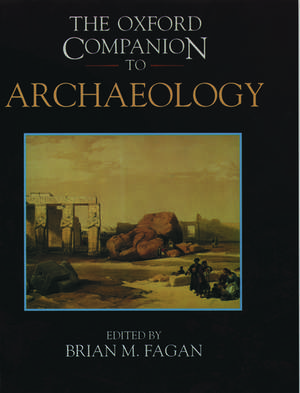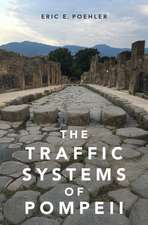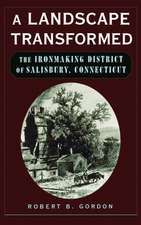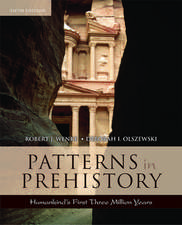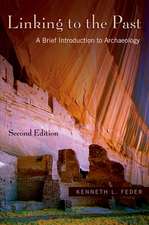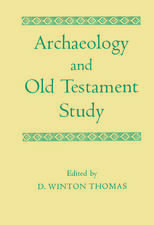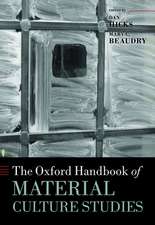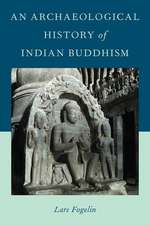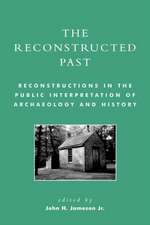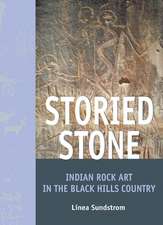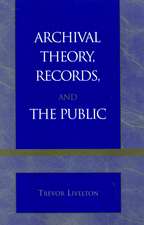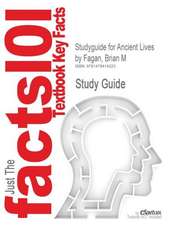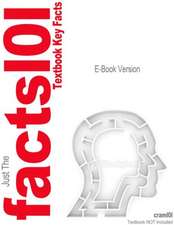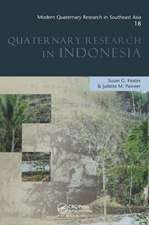The Oxford Companion to Archaeology: Oxford Companions
Editat de Brian M. Faganen Limba Engleză Hardback – 13 mar 1997
Din seria Oxford Companions
-
 Preț: 325.09 lei
Preț: 325.09 lei - 24%
 Preț: 378.95 lei
Preț: 378.95 lei - 16%
 Preț: 205.95 lei
Preț: 205.95 lei -
 Preț: 303.24 lei
Preț: 303.24 lei - 14%
 Preț: 328.68 lei
Preț: 328.68 lei - 13%
 Preț: 311.20 lei
Preț: 311.20 lei - 14%
 Preț: 298.39 lei
Preț: 298.39 lei - 14%
 Preț: 215.91 lei
Preț: 215.91 lei - 11%
 Preț: 325.48 lei
Preț: 325.48 lei - 12%
 Preț: 287.11 lei
Preț: 287.11 lei - 10%
 Preț: 296.49 lei
Preț: 296.49 lei - 13%
 Preț: 228.09 lei
Preț: 228.09 lei - 21%
 Preț: 374.49 lei
Preț: 374.49 lei - 27%
 Preț: 1277.89 lei
Preț: 1277.89 lei - 7%
 Preț: 191.99 lei
Preț: 191.99 lei - 33%
 Preț: 727.08 lei
Preț: 727.08 lei - 21%
 Preț: 335.21 lei
Preț: 335.21 lei - 34%
 Preț: 1628.95 lei
Preț: 1628.95 lei - 7%
 Preț: 354.72 lei
Preț: 354.72 lei -
 Preț: 94.83 lei
Preț: 94.83 lei - 6%
 Preț: 201.66 lei
Preț: 201.66 lei - 14%
 Preț: 358.69 lei
Preț: 358.69 lei - 33%
 Preț: 687.23 lei
Preț: 687.23 lei - 25%
 Preț: 431.55 lei
Preț: 431.55 lei - 29%
 Preț: 515.39 lei
Preț: 515.39 lei - 24%
 Preț: 639.62 lei
Preț: 639.62 lei - 18%
 Preț: 274.02 lei
Preț: 274.02 lei - 33%
 Preț: 563.46 lei
Preț: 563.46 lei - 29%
 Preț: 740.21 lei
Preț: 740.21 lei -
 Preț: 250.91 lei
Preț: 250.91 lei - 33%
 Preț: 1349.05 lei
Preț: 1349.05 lei - 6%
 Preț: 301.21 lei
Preț: 301.21 lei -
 Preț: 358.17 lei
Preț: 358.17 lei
Preț: 490.88 lei
Preț vechi: 694.86 lei
-29% Nou
Puncte Express: 736
Preț estimativ în valută:
93.93€ • 98.33$ • 77.72£
93.93€ • 98.33$ • 77.72£
Carte tipărită la comandă
Livrare economică 25-31 martie
Preluare comenzi: 021 569.72.76
Specificații
ISBN-13: 9780195076189
ISBN-10: 0195076184
Pagini: 864
Ilustrații: maps and charts
Dimensiuni: 246 x 200 x 53 mm
Greutate: 1.75 kg
Ediția:New.
Editura: Oxford University Press
Colecția OUP USA
Seria Oxford Companions
Locul publicării:New York, United States
ISBN-10: 0195076184
Pagini: 864
Ilustrații: maps and charts
Dimensiuni: 246 x 200 x 53 mm
Greutate: 1.75 kg
Ediția:New.
Editura: Oxford University Press
Colecția OUP USA
Seria Oxford Companions
Locul publicării:New York, United States
Recenzii
The match between authors and topics is impressive. Fagan has somehow persuaded top archaeologists to write about what they know best. The Oxford Companion is aimed at students and serious professionals as well as the general public, and has strong entries dealing with ideas, political issues and intellectual principles.
The 700 articles in its 840 pages are arranged alpgabetically, cross-referenced, and supplemented with maps and chronological tables.
A first place to start for all your future enquiries.
What is the difference between a companion, a dictionary, an encyclopedia ... In the case of The Oxford Companion to Archaeology, the answer is its sheer readability ... this volume may be pleasurably read from cover to cover ... It maintains a quality of writing and depth of analysis across a huge variety of topics ... this book is an authoritative and clearly written global assessment of archaeology that judiciously balances the well publicised with the less well known.
Like all Oxford Companions, it aspires to be the definitive overview of the subject.
An excellent overview of what it is that archaeologists do and have done ... It ranges widely from the expected (Giza, Easter Island and so forth) to the unexpected (archaeology in science fiction), via some helpful, intelligent entries.
The 700 articles in its 840 pages are arranged alpgabetically, cross-referenced, and supplemented with maps and chronological tables.
A first place to start for all your future enquiries.
What is the difference between a companion, a dictionary, an encyclopedia ... In the case of The Oxford Companion to Archaeology, the answer is its sheer readability ... this volume may be pleasurably read from cover to cover ... It maintains a quality of writing and depth of analysis across a huge variety of topics ... this book is an authoritative and clearly written global assessment of archaeology that judiciously balances the well publicised with the less well known.
Like all Oxford Companions, it aspires to be the definitive overview of the subject.
An excellent overview of what it is that archaeologists do and have done ... It ranges widely from the expected (Giza, Easter Island and so forth) to the unexpected (archaeology in science fiction), via some helpful, intelligent entries.
Notă biografică
Brian M. Fagan is Professor of Anthropology at the University of California, Santa Barbara. He is internationally known for his books and articles on archaeology for general readers, among them The Rape of the Nile, The Adventure of Archaeology, and Time Detectives.Charlotte Beck is Assistant Professor of Anthropology at Hamilton College. George Michaels is a Mayan archaeologist and an Instructional Consultant at the University of California, Santa Barbara. Chris Scarre is Assistant Director of the McDonald Institute for Archaeological Research at the University of Cambridge. Neil Asher Silberman is an independent scholar.
